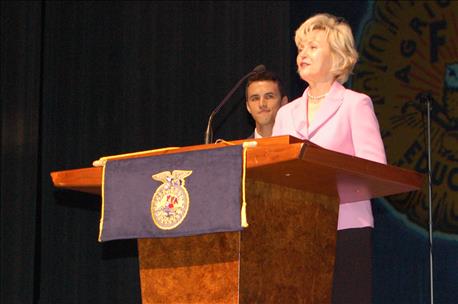
Go back in time to Jan. 1, 2016. Mike Pence was governor and Sue Ellspermann was lieutenant governor. Ellspermann was also secretary of the Indiana State Department of Agriculture. How Indiana politics have changed since then!

PROUD HERITAGE: Whoever becomes Indiana's lieutenant governor and secretary of agriculture has big shoes to fill. Here, Becky Skillman, Indiana’s first secretary of agriculture, addresses the 2010 Indiana FFA Convention while then-Indiana FFA President Travis Martin looks on.
First, Ellspermann resigned, making room for Eric Holcomb to become lieutenant governor. With it came the title of secretary of agriculture. Later, Ellspermann was named the new leader for Ivy Tech in Indiana. Not long after that, Mike Pence became the Republican vice presidential nominee, and as required by law, withdrew from the governor’s race in 2016. The only thing that’s certain now is that six months from now, Indiana’s governor won’t be Mike Pence, and Sue Ellspermann won’t be Indiana’s secretary of agriculture.
The real question is, will agriculture figure at all into determining who those two people are, and especially who the lieutenant governor will be? After all, the lieutenant governor by statute becomes a very important player in Indiana agriculture. He or she becomes secretary of agriculture.
Lost in the shuffle?
In all the political maneuvering that has gone on during the past several months in Indiana politics, will the candidates for lieutenant governor embrace the importance of their potential role as secretary of agriculture? Or will the position just get lip service during the campaign? Will it just be another duty inherited, or will the successful candidate truly embrace secretary of agriculture as an important position?
The case can easily be made that both Becky Skillman and Sue Ellspermann thoroughly embraced their roles as secretary of agriculture and also head of rural development. They were front and center at openings or expansions of various agricultural businesses, involved with Indiana FFA, and energetic when it came to trying to expand foreign trade. Both also embraced soil conservation efforts and seemed to understand that Indiana itself needs to play an important role in funding protection of natural resources, including soil and water, instead of leaving it to landowners and the federal government.
Take a stand
Indiana farm groups, including Indiana Farm Bureau and various commodity organizations, will no doubt be watching this political race very carefully. Many of their questions and concerns will be geared toward the head of the ticket: the two candidates for governor. Let’s hope they also save some questions for the lieutenant governor candidates — one of whom they will be working with closely within just a few months.
What questions would you ask the lieutenant governor candidates to determine their stance on agriculture if you had the chance? Here are five, just for starters:
1. What would you do to continue the trend of attracting ag businesses to move to Indiana?
2. How would you work with the Legislature and county leaders to improve the image of livestock as a business opportunity within Indiana?
3. Would you consider restructuring the Indiana State Department of Agriculture, or do you believe it is fulfilling its purposes as it is?
4. Gov. Pence talked often about expanding vocational education, including ag education. Yet many high schools don’t offer ag classes or FFA, and there is an ag teacher crisis in this state. How would you address these challenges?
5. Indiana is considered a leader in the soil health movement within soil conservation circles, largely due to efforts of the soil conservation partnership here. What would you do to make the state’s role even bigger within that partnership?
It’s a good place to start. Add your own questions, and if you get the chance, ask them of each candidate. Let’s hope both candidates for lieutenant governor also cherish the opportunity to become Indiana’s secretary of agriculture.
About the Author(s)
You May Also Like




